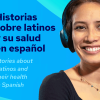Salud, the Spanish language series which focuses on health issues in the Latino community, has returned to GBH's airwaves. The show, produced in collaboration with El Planeta, is now in its second season. Tibisay Zea, the show's host, joined GBH's Morning Edition co-host Jeremy Siegel to talk about the new season. This transcript has been lightly edited.
Salud airs Saturday mornings at 9:30 a.m. on GBH. It’s also available on Apple Podcasts, Spotify, and other podcast platforms.
Jeremy Siegel: You and I spoke at the outset of the initial launch of the show, and you talked about the importance of focusing on health issues specific to the Latino community to combat misinformation and skepticism surrounding medicine. I want to talk about the importance of the way you're covering these issues and how this is a Spanish language show, because people listening know GBH as a station usually broadcasting in English. It's kind of an obvious question, I imagine, in some ways. But why is it important to have the show in Spanish?
Tibisay Zea: This is a country that offers a lot of opportunities for immigrants like myself, but yet it is very unequal and it doesn't really offer the best standards of living for many people, which affects our health. And in fact, the U.S. has the lowest life expectancy of any high-income country, which is only 76 years old. And something we found interesting and shocking at the same time is that Hispanics have higher risks of having many health problems like diabetes, Alzheimer's disease and hypertension compared to other groups, in part because we are less likely to have health insurance and to receive preventive medical care, to have a primary doctor. And this is concerning.
All of this has to do with the fact that our health system is very complicated here in the U.S. from how to qualify, how to enroll, how it works, you know, that terminology. You have co-payments, deductibles, out-of-pocket expenses, Medicare, Obamacare, Medicaid, all the different letters that arrive in the mail when you enroll in health insurance. So that can be very confusing and complicated to understand. It's overwhelming for most people. And imagine how it is for immigrants that are not familiar at all with how it works, and many times they don't have the language. So we think this podcast gives a critical voice to the diversity of the American experience in terms of health care, the voice of the Latinos, which is the population that keeps growing and growing. We believe this is just a public service for Spanish speakers in this country: High quality, reliable information about health care in Spanish. More than 40 million people speak Spanish in this country.
Siegel: And you've already had one season of this show air on GBH. I'm curious, have you heard from any people about how they're receiving the show, people in the Latino community around here in Massachusetts about what it's meant for them?
Zea: Yes, it was well-received. We launched our first season last year in the fall, and we got a lot of comments, people even suggesting new topics. They were interested. And actually, the first episode of our second season, in which we explained the many barriers and obstacles that Latinos have to access health care — that's an idea that came from one of our listeners that was so frustrated because she was getting all these letters in the mail that she couldn't understand, even though the letters were in Spanish. But they were just so confusing that she wanted to understand: Help me understand how to enroll in health insurance. So we decided to do a whole episode about how complicated our health care system is and how to map, how to navigate it. What I think is important is that we try to bring Latinos into the show to tell the stories.
Siegel: So in addition to this episode that helps people figure out the complicated nature of the health care system, what else can someone who's tuning in this Saturday or catching up with the feed of Salud where they get their podcasts — what can they expect this season? Any other topics you're particularly interested in having covered this year?
Zea: So this time we have episodes on childhood obesity, oral health, also cardiovascular diseases. We have one episode that we highly recommend about the Fentanyl crisis, which is a well-documented national emergency, which is also affecting Latinos, many Hispanics in this country. We faced a lot of disadvantages in terms of access to health care. Part of it is because immigrants tend to have jobs with little flexibility to ask for — you know, days off to go to a medical appointment, for example, or we tend to have jobs with low pay. So many times, immigrants have to work multiple jobs or live in areas where there are less medical centers, less opportunities to exercise outdoors or to buy healthy food. And this is why we think that this podcast is important, because it's useful information in their language, and we are trying to just educate people on health care basics.









